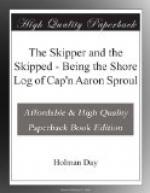“We’re not giving you license to let any one run toll on this bridge, you understand,” said the director, “but this fighting Colonel Ward with our property is another matter. It’s like fighting a bear with your fists. And even if you killed the bear, the hide wouldn’t be worth the damage. He has got too many ways of hurting us, Cap’n. He has always had his own way in these parts, and he probably always will. Let him go. We won’t get the toll, nor the fines, but we’ll have our bridge left.”
“I was thinking of resigning this job,” returned the Cap’n; “it was not stirrin’ enough for a seafarin’ man; but I’m sort of gittin’ int’rested. How much will ye take for your bridge?”
But the director curtly refused to sell.
“All right, then,” said the skipper, chocking his axe viciously into a sapling birch and leaving it there, “I’ll fill away on another tack.”
For the next two weeks, as though to exult in his victory, the Colonel made many trips past the toll-house.
He hurled much violent language at the Cap’n. The Cap’n, reinforced with his vociferous parrots, returned the language with great enthusiasm and volubility.
Then came the day once more when the little woman sat down in a chair in the shade of the woodbine.
“I took the first chance, Cap’n, while my brother has gone up-country, to come to tell you how much I appreciate your generous way of doing what I asked of you. You are the first man that ever put away selfish pride and did just what I asked.”
The seaman started to repudiate vigorously, but looked into her brimming eyes a moment, choked, and was silent.
“Yes, sir, you’re what I call noble, not to pay any attention to the boasts my brother is making of how he has backed you down.”
“He is, is he?” The Cap’n rolled up his lip and growled.
“But I know just how brave you are, to put down all your anger at the word of a poor woman. And a true gentleman, too. There are only a few real gentlemen in the world, after all.”
The Cap’n slid his thumb into the armhole of his waistcoat and swelled his chest out a little.
“There was no man ever come it over me, and some good ones have tried it, ma’am. So fur as women goes, I ain’t never been married, but I reckon I know what politeness to a lady means.”
She smiled at him brightly, and with such earnest admiration that he felt a flush crawling up from under his collar. He blinked at her and looked away. Starboard, with an embarrassing aptness that is sometimes displayed by children, whistled a few bars of “A Sailor’s Wife a Sailor’s Star Should Be.”
“I don’t mind owning up to you that my brother has imposed upon me in a great many ways,” said the little lady, her eyes flashing. “I have endured a good deal from him because he is my brother. I know just how you feel about him, Cap’n, and that’s why it makes me feel that we have a—a sort of what you might call common interest. I don’t know why I’m talking so frankly with you, who are almost a stranger, but I’ve been—I have always lacked friends so much, that now I can’t seem to help it. You truly do seem like an old friend, you have been so willing to do what I asked of you, after you had time to think it over.”




